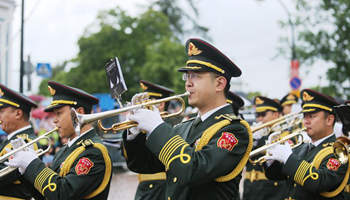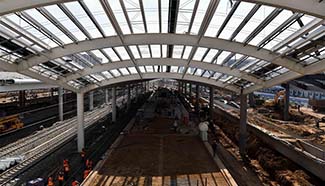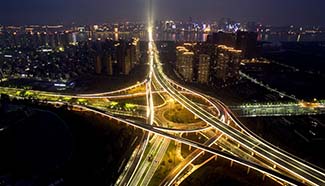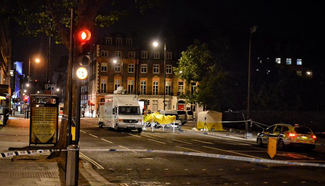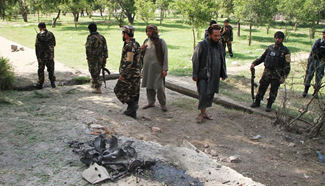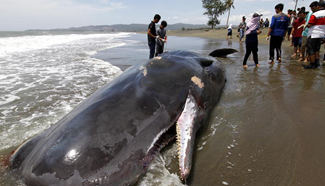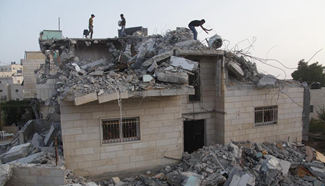
People from Seongju county hold banners to protest against the deployment of the Terminal High Altitude Area Defense (THAAD), during a rally in Seoul, capital of South Korea, on July 21, 2016. More than 2,000 people from Seongju county, where one THAAD battery will be deployed, gathered at a square in Seoul for a rally on Thursday, to protest against the deployment of THAAD. (Xinhua/Yao Qilin)
BEIJING, Aug. 4 (Xinhua) -- Both China and Russia oppose the planned deployment of the U.S. Terminal High Altitude Area Defense (THAAD) system on the Korean Peninsula, which endangers their national security and challenges the region's strategic balance.
The joint decision by the United States and South Korea is seen as part of a Washington-intended global anti-missile shield to serve U.S. hegemony. The move, with the declared purpose of protecting South Korea from alleged missile and nuclear threats from the Democratic People's Republic of Korea, is no doubt intended for China and Russia.
The THAAD system is useless against low-altitude missiles from the North, but its X-band radar could easily penetrate into the territories of China and Russia, which the United States considers the main challengers to its supremacy.
Deployment of such an anti-missile system is expected to prompt countermeasures and an arms race with a new Cold War looming in the region. Russian analysts believe this is the most serious military provocation in years in Northeast Asia.
Political trust could be unraveled, prosperous economic and trade ties could be destabilized and regional security could worsen.
As the Korean Peninsula plays an important role in the international geopolitical landscape, it is in the interests of China and Russia to maintain peace and stability there.
The United States should not underestimate the determination of both countries to safeguard their strategic security interests. The two countries are coordinating closer than ever before, which will serve as a basis to face the THAAD challenge.
For Washington, its devoted efforts towards a global anti-missile shield also reveals an anxiety over its declining influence in the world and a lack of confidence in keeping its territory safe. However, safeguarding its own security while putting other countries at risk is simply intolerable.
Related:
China Voice: Washington's THAAD muscle flexing unmasks anxiety over declining hegemony
BEIJING, Aug. 4 (Xinhua) -- The controversial deployment of the Terminal High Altitude Area Defense (THAAD) system on the Korean Peninsula yet again betrayed Washington's deep-rooted Cold War mentality and its petty anxiety over the United States' declining global hegemony.
The Republic of Korea (ROK) last month announced plans for a U.S.-made THAAD battery to be deployed in Seongju County, 300 km southeast of Seoul, by the end of next year. Full story
China Voice: ROK should rethink THAAD deployment
BEIJING, Aug. 3 (Xinhua) -- With the Republic of Korea (ROK) continuing to stress the need to deploy the Terminal High Altitude Air Defense (THAAD) system on its territory, Seoul has been tied to Washington's chariot.
The ROK has become the outpost of the United States missile defense system. Apparently, the ROK has been dangerously coerced by the United States. The ROK media have been quite clear about this. Full story
China Voice: Hot-headed Seoul skating on thin ice with THAAD plan
BEIJING, Aug. 2 (Xinhua) -- The controversial deployment of the Terminal High Altitude Area Defense (THAAD) system on the Korean Peninsula is increasing concerns in neighboring China where some worry that a new Cold War is looming.
But make no mistake. It is not fear of the U.S. anti-missile shield that drives such concerns, for China has never, and will never, accepted threats that encroach on its national security. Full story
Interview: THAAD deployment in S. Korea threatens regional stability: Russian military expert
MOSCOW, Aug. 3 (Xinhua) -- The deployment of the Terminal High Altitude Area Defense (THAAD) system in South Korea poses a threat to Russia and China and undermines peace and stability in the region, a Russian military expert has said.
"By doing so, conditions are created for solving the nuclear problem of the Democratic People's Republic of Korea (DPRK) with military means. This is very dangerous and this may have unpredictable consequences," Konstantin Sivkov, an associate member of the Russian Academy of Rocket and Artillery Sciences, told Xinhua in a recent interview. Full story



